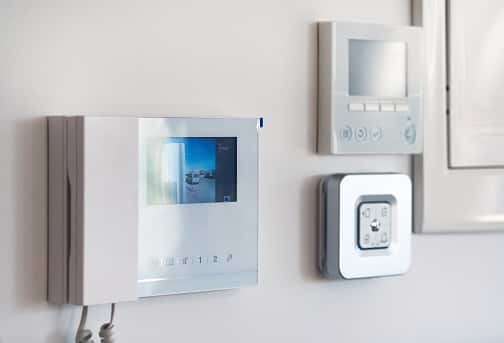Best DIY home security systems
Compare reviews, equipment and costs

Do-it-yourself home security systems are a popular choice for home alarms because they are versatile and more affordable than traditional, hard-wired systems. Sometimes, you don’t even have to sign a contract.
Most DIY security systems include window and door monitors, a keypad and a base station. Some might also include a camera, glass break sensors, water leak sensors and more. With so many options out there, it can be hard to know which is the best DIY home security system to protect your home and family.
Our picks:
Compare our top 7 DIY home security systems
To come up with our top picks, we started with a list of dozens of home security companies that are featured in our buyers guide. After narrowing it down to the ones that specialize in DIY systems, we compared cost, features, ease of installation and available monitoring plans to inform our top picks.
We also tried many of our top picks hands-on to see how they work in real-world situations.
- Self-monitoring option: Yes
- Required contract: No
- Warranty: One-year limited warranty
- Cameras work without system: No
ADT Self Setup (formerly Blue by ADT) has customizable systems that integrate with most smart-home automation devices. The free nonmonitored plan is a definite perk, and professional monitoring services start at $24.00 per month. The best part about this system is it’s backed by ADT, which is one of the oldest and most experienced security companies around.
What to consider
What reviewers like
“Love it. Would not trade it for the world,” a recent reviewer in California said. “I got it due to car theft and for protection for my family and it’s the best thing I ever invested in. The alarm is loud and the Chime is on every window.”
- Self-monitoring option: No
- Required contract: 36 months (if financing)
- Warranty: Three-year limited warranty
- Cameras work without system: No
With Frontpoint, you have choices. You can buy the equipment upfront to avoid getting into a long-term contract, or you can finance the system over 36 months.
Either way, professional monitoring fees are around $50 per month. The good part is you get more for your money: Frontpoint offers extras along with monitoring like identity theft protection.
Typical upfront costs are between $100 and $800. As of publishing, you can start off with The Starter package — central hub and keypad, window sensors and a motion sensor — for $129.
What to consider
“If you have pets, the motion sensors are not a good choice,” according to one reviewer in Indiana , who told us they have two cats. “If a cat were to jump up on a table, the alarm goes off. It's good, but it's overly sensitive.”
What reviewers like
For example, if you just had a break-in and want a home security system right away, Frontpoint can accommodate you, even if it’s a holiday, according to a reviewer in Nevada . They added: “I like the fact that I didn't have to deal with anyone personally. It was just a phone call and it was set up. The equipment was sent to me and I installed it myself. Everything's fine with Frontpoint. It's worth the money.”
- Self-monitoring option: No
- Required contract: No
- Warranty: One-year to lifetime warranty
- Cameras work without system: No
Cove sells home security products that can be combined to create a holistic approach to security. All products include RapidSOS, which sends electronic data to 911 dispatch for faster support. Professional monitoring is available for as little as $17.99 per month with no contracts.
What to consider
What reviewers like
“We have had our Cove system for almost a year,” said a customer from Utah . “We love love love it. Easy to use. Easy setup. Customer service has been super awesome when I’ve had questions. My entire family owns one now. I obviously would recommend this product to anyone.”
Other customers commented on the robust options offered by the company.
“They offered … a full security solution, which is hard to find with the big brands,” said another Utah customer . “It seems like they really care.”
- Self-monitoring option: Yes
- Required contract: One to three years
- Warranty: Three-year limited warranty
- Cameras work without system: Yes
Link Interactive gets great reviews from customers on our site. It currently has 4.6 stars out of five, most likely because it’s affordable and trustworthy and has a lot of smart gadgets.
This DIY system offers a wide selection of indoor, outdoor and doorbell cameras, plus 24-hour recording and video monitoring features. Smart locks, smart plugs and other cool gadgets are also available. Upfront equipment costs vary, and monthly fees range from $30.99 to $47.99.
What to consider
What reviewers like
“I liked the cheapness of the camera and the ease of how it was to process. Everybody else wanted my life history, social security number and all that, and Link just wanted payment,” a reviewer in Georgia told us. “The equipment I got is great. My sense of security is a little bit better now. I can see who's coming into my driveway now.”
According to another reviewer in Vermont : “Link Interactive is a quick and easy service. Once I contacted them, I found they were super fast. I ordered my system at around 3 o'clock Eastern Time. By the afternoon of the next day, I had already received all of their equipment.”
- Self-monitoring option: Yes
- Required contract: No
- Warranty: One-year limited warranty
- Cameras work without system: No
SimpliSafe has a wide array of affordable security options and competitive monthly rates ($9.99 to $27.99), though you can choose to not use a monthly subscription. If you’re anxious to get the system up ASAP, you might be able to pick up a SimpliSafe kit at your local Home Depot, Best Buy, Sam’s Club or Costco. Plus, there are no contracts.
What to consider
What reviewers like
A reviewer in Texas likes how you have “complete control” over the system. For example, you can program door alarms to go off after 30 or 45 seconds and window alarms to go off instantly. With the premium monthly plan, you can get unlimited camera alerts, video storage, mobile alerts and water damage monitoring.
- Self-monitoring option: Yes
- Required contract: No
- Warranty: One-year limited warranty
- Cameras work without system: Yes
Ring is a great pick for an affordable home security system. You can get started with a Ring alarm security kit for around $250 and then self-monitor for free. Kits are expandable, so it’s easy to add equipment to the system later on.
The free self-monitoring plan has some standard features, like motion-activated notifications and real-time video. However, it costs extra (up to $10 per month) to be able to record, save or snapshot the video.
What to consider
Or, if you want to just focus on adding security cameras right now, Ring is the best choice. All of Ring’s cameras can be used without a security system, unlike most of the other picks on our list.
What reviewers like
“The overall security system is great because it allows you the ability to connect between different devices,” according to another reviewer in California . “I am able to connect my outdoor floodlight camera with the Ring mobile app and my doorbell camera. It's also great you can connect it to your Amazon Alexa device to view who is at your front door.”
- Self-monitoring option: Yes
- Required contract: No
- Warranty: One-year limited warranty
- Cameras work without system: No
Out of all the systems on our list, Abode works with more smart-home integrations to help protect your house and family from fire, flood and break-ins. In fact, it is the only security system that works with Apple Homekit.
Security kits start between $190 and $330. Stand-alone cameras, motion sensors and other smart devices are available for an additional charge.
What to consider
What reviewers like
How to choose a DIY security system
Not surprisingly, researching the DIY security company should be at the top of your list when choosing a system.
“If you're opting for a DIY home security system instead of a professionally installed one like Vivint or ADT, I think the most important thing to consider is the reputation and track record of the DIY company,” said Rebecca Edwards, security and safety expert at SafeWise.com.
Many DIY systems let you add more devices later, so it pays to think about whether you want to expand your system later when shopping.
Edwards added that it’s important to find out what kind of customer help and support are available — especially since you have to install it yourself. You don't want faulty installation to impact your security, so knowing that reliable experts are on call to help is important.
Look for a system that will give you all the devices you need too. Some companies offer basic devices like motion sensors and key fobs, while others offer an expanded lineup. Here are some devices to look for:
- Garage door sensors
- Fire, smoke and carbon monoxide detectors
- Indoor/outdoor cameras
- Doorbell cameras
- Smart locks
- Floodlights
- Emergency alert buttons
- Glass break sensors
- Water leak sensors
Another thing to consider is the app.
“If you're truly looking to go DIY, including monitoring your system on your own, the most important thing will be a mobile app that gives you remote alerts, lets you check in on video from your phone, and doesn't cost too much to access,” Edwards said.
How much do DIY security systems cost?
DIY security systems typically cost from $100 to $700. If you choose self-monitoring, there may be no subscription cost, though some companies may charge a small fee to record and store video. Companies charge extra for professional monitoring services — up to $60 per month.
Add-on equipment also factors into overall costs. Starter kits come with basic components, but you’ll have to spend more if you want to expand the system with extra cameras or sensors.
» READ MORE: How much does a home security system cost?
Benefits of a DIY security system
There are two big benefits of a do-it-yourself security system. First, DIY systems are for people that want to save money by installing their systems themselves. A typical professional installation costs upwards of $70.
Second, DIY security systems are perfect for those that hate interrupting their schedule to wait for an installation person. You can usually set up one of these systems with limited tools (often just a screwdriver) in just an hour or two in your free time.
» LEARN MORE: Security system installation: DIY versus professional
DIY home security FAQ
What is a DIY security system?
A DIY security system is installed by the customer. The security company ships the equipment to the purchaser with instructions for setup. Most DIY systems are wireless and use Wi-Fi and a cellular network.
DIY systems typically include the following components:
- Controls: A control panel and keypad are standard. Motion and window sensors also come with most systems. The control panel, sometimes called a “hub” or “base,” is essentially the brains behind the whole system.
- Camera: We suggest at least one outdoor video camera posted by your front door. For more, read about how to find the best DIY security camera.
- Sensors: Entryway sensors are for doors. The window or contact sensor can trigger an alert if anything is opened or closed. Motion detectors are good for hallways. You can also get an integrated smoke detector, glass break sensors and other smart-home devices.
» DISCOVER: Best wireless home security systems
Are DIY security systems good?
Overall, DIY security systems are great for apartments and homes that don’t require complex security systems. They’re often easier to move to another residence, which makes them ideal for renters.
Doing it yourself also saves money, but it does require some effort on your part, like climbing a ladder or keeping track of sensor placements. You should consider professional installation if your home needs more advanced security arrangements or is very large.
A few popular home security companies require professional installation, even though many of the components are wireless. Companies may charge an installation fee (typically between $75 and $200) and require a long-term contract.
How do you install your own home security system?
Most of the time, you can install a DIY home security system in an hour or two. Usually, you start with the wireless control panel or base. You attach it to a wall by your primary entry door with removable, double-sided adhesive or a small nail.
“Peel-and-stick” backings and magnets are increasingly common on various sensors and detectors. This makes it easy to install your devices without tools.
Can I take my DIY system with me if I move?
Yes, in most cases, the system can be removed and installed in a new residence without any hassles. This is why wireless equipment is an attractive option for renters and those who don’t plan to stay in their homes for a long time.
How do I protect my DIY security system from hacking?
There are several ways you can protect a wireless security system from hacking, including:
- Making sure your Wi-Fi is password-protected
- Enabling encryption on your router
- Verifying that the system’s app has a strong password and two-factor authentication
Can I monitor my own alarm system?
Yes, several popular DIY home security systems allow self-monitoring (alerts go straight to your phone rather than to a monitoring center).
» DISCOVER: Best self-monitored home security systems
You’re signed up
We’ll start sending you the news you need delivered straight to you. We value your privacy. Unsubscribe easily.









